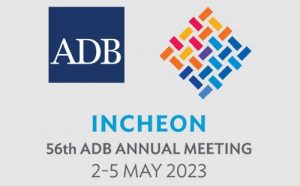 I. Introduction
I. Introduction
ABA officers and memberbank representatives – including ABA Chairman Mr. Eugene Acevedo, President and CEO of the Rizal Commercial Banking Corporation (RCBC) from the Philippines, and ABA Vice Chairman Mr. Oliver Hoffmann, Managing Director and Head of Asia, Erste Group Bank, Hong Kong Branch – and an executive of the ABA Secretariat Deputy Secretary Mr. Amador R. Honrado Jr., joined some 4,500 other delegates from private and public sector organizations who attended the 56th Annual Meeting of the Board of Governors of the Asian Development Bank (ADB) held on May 2-5, 2023 in Incheon, South Korea.
The attendees came from ADB’s 67 member economies and other countries, including government officials, business leaders, youth, academics, journalists, and representatives from civil society and development partner organizations from Asia and the Pacific, and from round the world.
Focusing on the theme “Rebounding Asia: Recover, Reconnect and Reform”, this year’s ADB annual meeting was designed to provide an excellent opportunity for policy makers and development leaders from across Asia and the Pacific to examine the key issues that will shape our region’s recovery from the COVID-19 pandemic. They also served as an important platform for the Republic of Korea to share the rich lessons it learned through its rapid economic development over the past generation with ADB’s developing member countries.
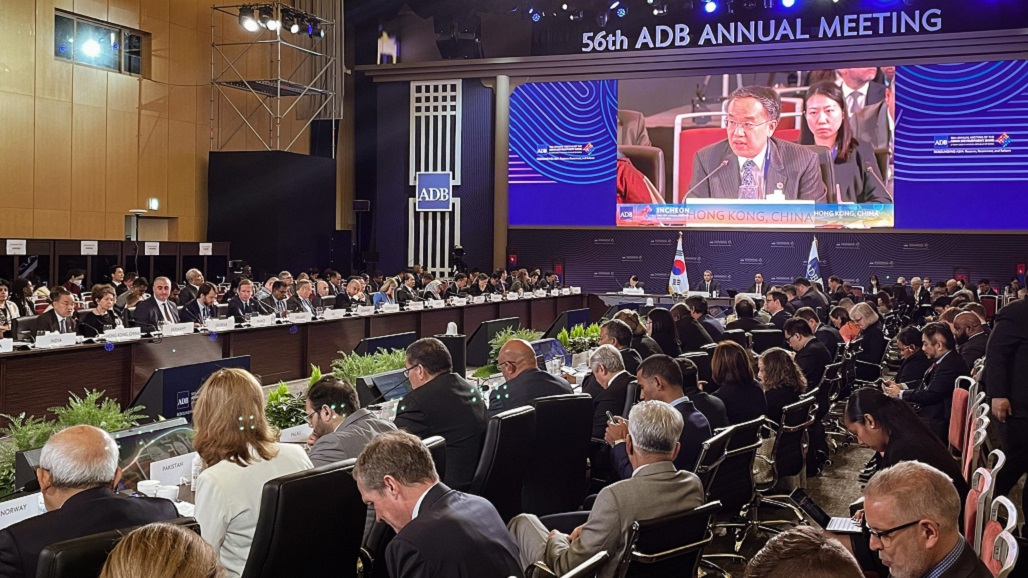
he ADB Board of Governors focused their meetings on ADB’s role in ensuring a sustainable and inclusive recovery in its developing member countries (DMCs), while contributing more to regional public goods such as climate change. They explored ways to expand ADB’s lending capacity to meet the strong demand for financing and knowledge.
The flagship Governors’ Seminar focused on policies needed to support the region’s rebound. Other seminars addressed topics such as workforce and technology needs of the region’s green transition, gender and financial inclusion, new sources of growth for Asia, and the private sector’s role in promoting sustainable green growth.
During the past several years, the ADB has accredited the ABA as a Guest Association in the Annual Meetings of its Board of Directors: in Fiji Islands (2029); Manila, Philippines (2018), Yokohama, Japan (2017); in Frankfurt, Germany (2016); Baku, Azerbaijan (2015); Astana, Kazakhstan (2014); New Delhi (2013); Manila (2012); Hanoi (2011); Tashkent (2010); Bali (2009); Madrid (2008); Kyoto (2007); Hyderabad (2006); and Istanbul (2005).
The Annual Meeting is the year’s largest gathering of the organization and an annual opportunity for ADB Governors to engage in focused discussion on development issues and challenges facing Asia and the Pacific.
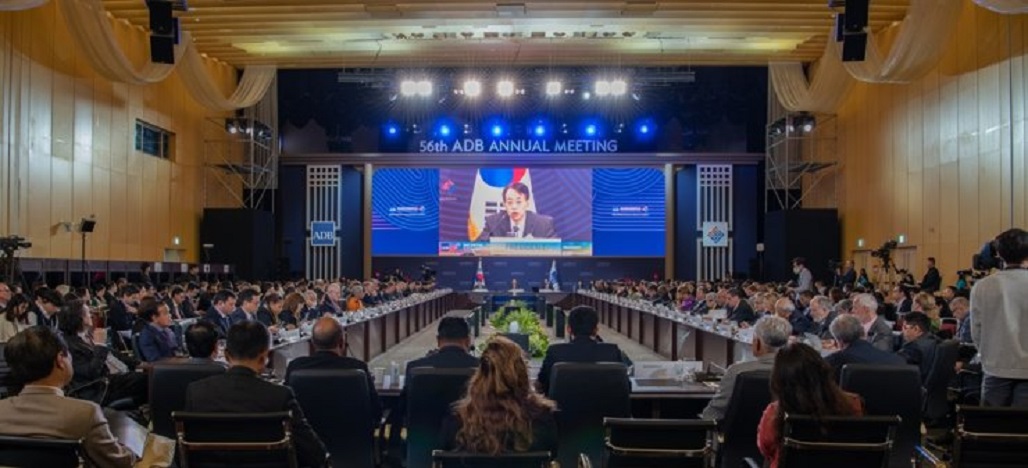
II. Highlights of the Incheon Meeting
(1) Opening Session
Masatsugu Asakawa, President, Asian Development Bank, in his address to the Board of Governors Opening Session at the 56th Annual Meeting held on 3 May 2023, pointed out that ADB is fully committed to supporting the journeys of all our developing members. “As we move forward together, we need to confront the big challenges of our times.
To do this, we should have a clear understanding of what needs to be done to rebound and recover. This includes the need to adapt and evolve, so that we can continue to serve our region effectively,” Mr. Asakawa said.
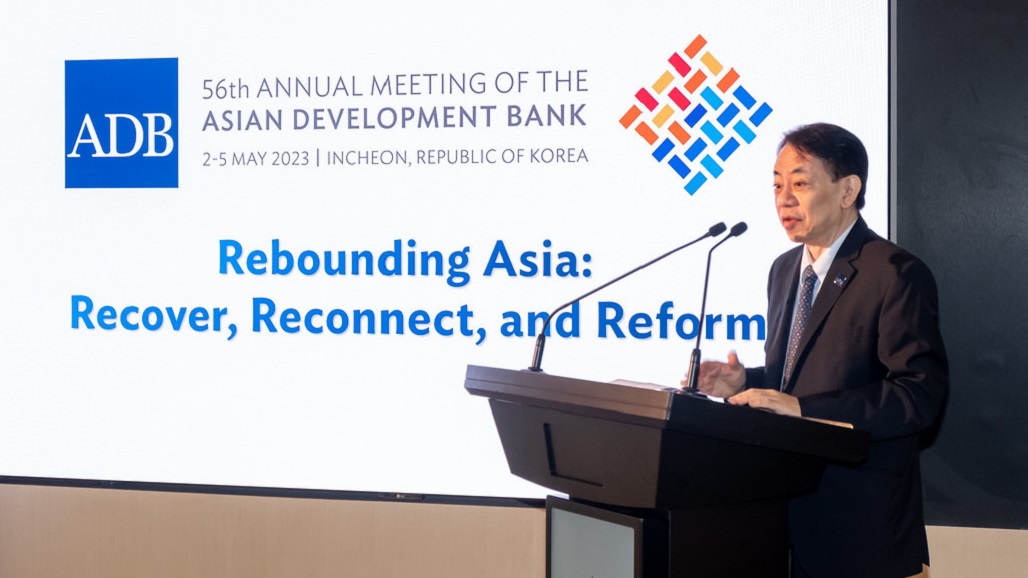
The need for evolution
“For decades, the ADB has been a steadfast partner on poverty reduction and regional development. We have been actively promoting resilience and sustainability through our Strategy 2030 and commitment to the Sustainable Development Goals…At the same time, we face enormous challenges. The scale and urgency of these challenges cannot be met with “business as usual.” We know, for example, that climate events are causing destruction on a scale never seen before; debt and other crises are limiting the ability of governments to meet the needs of their people; and millions of people are at risk of falling back into poverty, and losing out on the opportunities of growing economies.
The agenda for evolution
“So, what do we need to do to meet these challenges? Let me offer three areas form consideration.
“First, we need to recognize that development is no longer possible without effective climate action. Green and resilient economies offer the only path to strong and lasting growth. Supporting this is fully compatible with the long-term development agendas that we have been pursuing with our developing member countries. So, let’s make every effort to help economies transition, swiftly and justly, to a net zero future. Let’s also ensure that people, including women and their communities, can adapt to climate change.
“Second, we need to be leaders in investing in global public goods. In addition to the environment, these are key building blocks for development. The pandemic showed us how public health crises require coordinated responses, as well as access for poor and vulnerable groups. We must build resilience across borders, and we must be ready to provide swift and effective support to meet future crises.
“And third, we must be a key player in the effort to mobilize the levels of financing now required for development, from billions to trillions. The traditional models of lending and grantmaking will not be enough. We need to answer the call for MDBs to do more to maximize our financing capacity through game-changing new mechanisms; to leverage the enormous investment potential of the private sector and philanthropies; and to maintain our place as a stable, reliable financial institution.
The faces of development
“My friends, let’s place these needs at the top of our minds at our meetings this week. Let us also remember the many faces of those whom we serve. Our work must always provide for good livelihoods and resilient communities; ensure opportunities – for example, for women and girls to participate in high quality, green jobs; equip developing member countries to sustain growth and generate resources domestically; and support transitions that are just and equitable.
(2) Seminar Sessions
A number of seminars were held during the course of the four-day event. These included the following:
Korea Seminar Day
Korea Seminar Day was a series of sessions addressing current issues facing Asia and the Pacific. It highlighted topics related to the Annual Meeting theme. It also showcased the experiences and culture of the host country, the Republic of Korea.
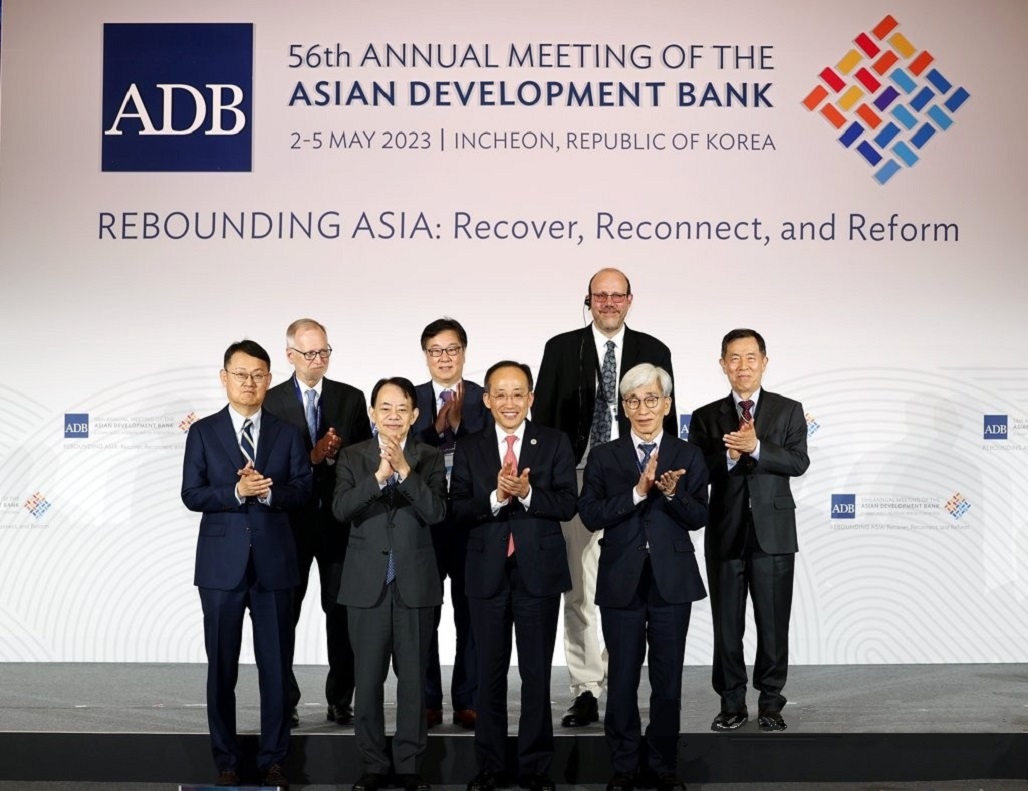
Funding Asia’s ESG Transition
Moderated by IFR Asia Bonds Editor Morgan Davis, IFR Asia’s panel of industry experts discussed trends in ESG financing and seek to identify opportunities for issuers and challenges facing investors. Speakers and panelists pointed out that Environmental, Social and Governance (ESG) financing has been a booming sector in Asia, with green, social, and sustainable debt offerings entering the mainstream, adding that Investors are keen to insure that issuers are not only focused on marketing benefits but also on meeting ambitious decarbonization targets.
Joint ADB-ASEAN+3 Report Launch: Reinvigorating Financing Approaches for Sustainable and Resilient Infrastructure in ASEAN+3
ASEAN+3 Finance Ministers and Central Bank Governors jointly launched a report with ADB on innovative financing solutions for infrastructure investments in the ASEAN+3 region. The report is intended as a user-friendly policy toolkit for companies, investors, policymakers, and financing agencies to promote the use of creative infrastructure financing models. The report also distills lessons learned and presents select case studies which could be adapted, replicated, or upscaled in the ASEAN+3 context.
The Green Transition, Needs a Green Workforce: The Role of Skills Development for a Just Transition
This seminar explored the critical role of skills development in preparing the workforce for the green economy. The focus was on facilitating the just transition for people whose livelihood depends on pollution-intensive sectors that will be phased out. Panelists discussed the importance of policy coordination, incentives, targeted reskilling and upskilling, and the role of the private sector in preparing workers for green jobs.
Challenging Ways Forward: Asserting Communities’ Considerations on Just Transition
Panelists discussed notions of just transition from the viewpoint of communities where ADB-supported projects are located. They presented insights into the recovery across the region within the context of the energy and climate crises, the inequities that have been exacerbated by the pandemic, growing debt service payments of borrowing members, and increasing constraints on civil society advocacy.
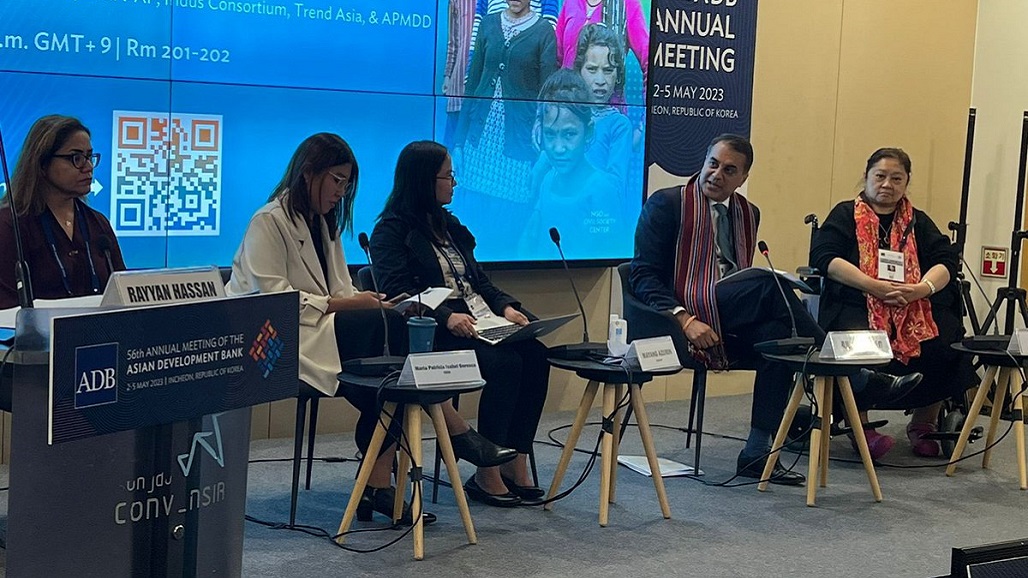
The Steps for Making the Regional Flyway Initiative a Reality
The session pointed out that the ADB Regional Flyway Initiative (RFI) is one of ADB’s flagship nature positive programs that will also deliver for people and the climate.
Launched at COP15 in 2021, the RFI is seeking to deliver $3 billion of investments into the sustainable management of wetlands along the East Asian-Australasian Flyway over the next 10-plus years. The session summarized progress since the RFI’s launch and highlight actions needed to move it from the development phase into the investment phase from 2023.
Financial Inclusion to Accelerate COVID-19 Recovery: Lessons in Evaluations
The panel of speakers mentioned that ADB’s Independent Evaluation Department’s recent evaluation of ADB’s financial sector operations highlights the importance of an enabling environment as well as innovations in digital technology to help address increased inequality through access to finance. Building on the findings of this evaluation, the panel issued surrounding digital finance and fintech serving the underserved of Asia and its potential to lead the region into an inclusive post-COVID recovery.
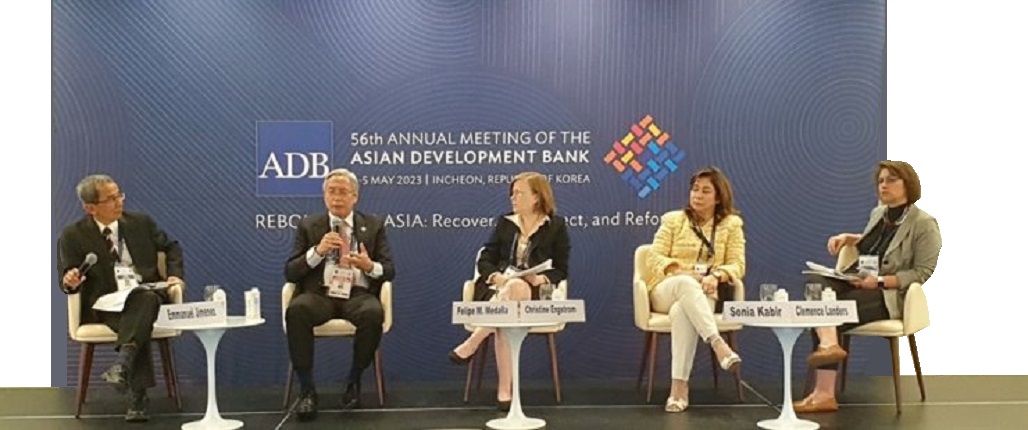
Approaching the Last Mile for a Strong Safeguard Policy
Noting that the ADB expects to release for public comments the draft Environmental and Social Framework as part of its Safeguard Policy Statement review process, this session aimed to present CSOs’ perspectives on the proposed changes in the safeguards policy architecture; their recommendations for strengthening the policy to align with global climate goals and international humanitarian standards; and to provide a venue for ADB’s project–affected communities to raise their concerns related to indigenous peoples’ rights, gender, and labor.
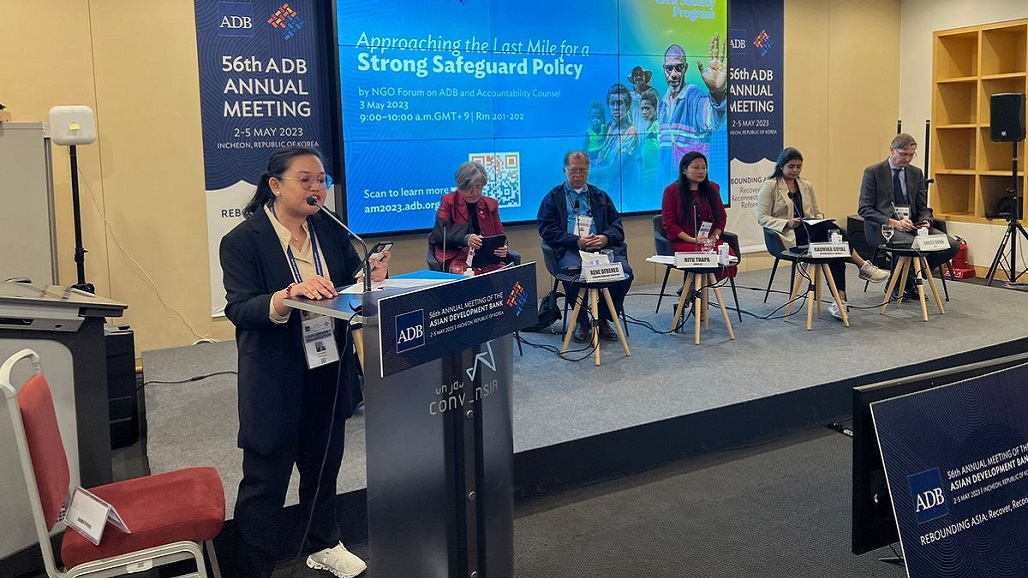
Can Cloud Computing Help Drive Post-COVID Economic and Social Recovery in Asia
Invited panelists noted that in the Post-COVID-19 era, governments, private enterprises, and citizens across Asia are striving to reconnect through the Cloud. This session highlighted three case studies on climate change, digital skills building, and sustainable infrastructure. The panel explored how digital transformation is driving economic opportunity, and how it can promote a more innovative government and private sector. It also explored policy frameworks for the Cloud and present a template for best practices in the digital economy.
ADB Project Briefing
In this event, ADB and project owners introduced major infrastructure and energy projects open to Korean and international companies. In addition, representatives from Korean institutions and the Asia-Pacific Project Preparation Facility (AP3F) advised on contract-winning strategies using government support programs. The program provided an opportunity for one-on-one consultations between ADB project owners and Korean engineering, procurement, and construction companies and offered practical tips on how to win a contract and participate in procurement.
Governonrs’ Seminar: Policies to Support Asia’s Rebound
Featured speakers pointed out that Asia’s recovery from the pandemic faces multiple challenges: Russia’s invasion of Ukraine threatens food and energy security; policy tightening has led to slowing global demand, capital outflows, depreciation, and challenges to debt sustainability; globalization and multilateralism are at risk of fracturing; and the need for action on climate change has become more urgent. The seminar addressed questions such as what policies should be prioritized to ensure that the region’s rebound remains resilient.
Civic Engagement and Multistakeholder Partnerships for SDGs in Asia
The session noted that the Sustainable Development Goals (SDGs) in 2023 are at the halfway mark to the 2030 Agenda roadmap. Today, alarm bells are ringing, as many countries in the region are off-track on SDGs, further slowed down by the COVID-19 pandemic. It stressed that now is the time to assess the SDGs midterm, draw lessons learned, and formulate strategies for 2030. The SDGs emphasize the value of multistakeholder partnerships between governments, the private sector, and CSOs to create a sustainable future. This session presented cases of CSO-private sector partnerships on SDGs across Asia and seek ways to establish meaningful relations between governments and CSOs.
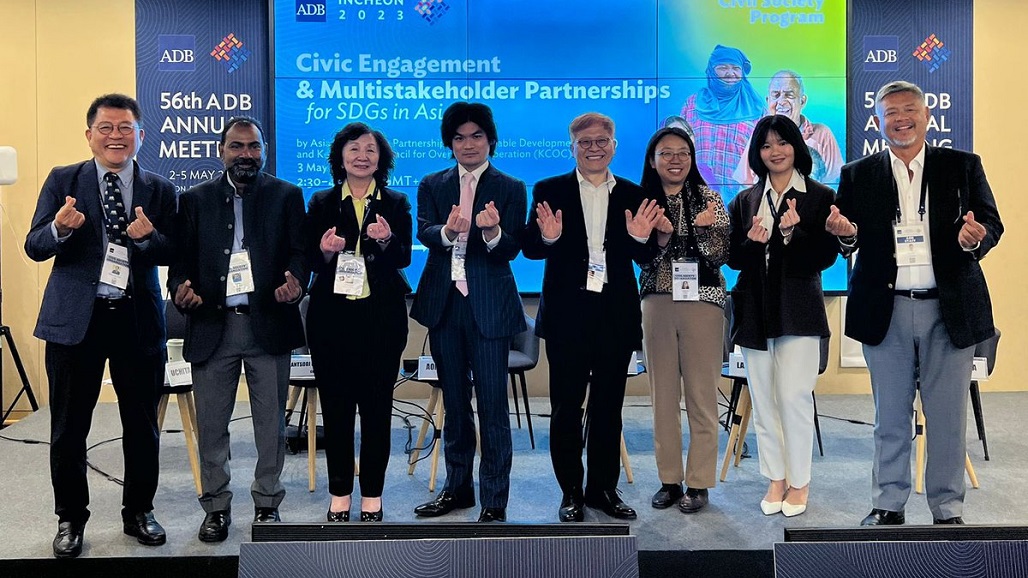
How ADB is Addressing the Climate-Food-Nature Nexus
The session recalled that at the 2022 ADB Annual Meeting, ADB announced plans to provide at least $14 billion over 2022–2025 in a comprehensive program of support to ease the worsening food crisis in Asia and the Pacific, and improve long-term food security by strengthening food systems against the impacts of climate change and biodiversity loss.
Digital Technologies and Financial Inclusion: Enablers for Gender Equality
Speakers emphasized that digital technologies have transformed how societies function in Asia and the Pacific, noting that while the digital transformation has been heralded for innovations that can help accelerate economic growth, it also presents new challenges such as how to ensure that these benefits can be equitably enjoyed by all. Women and girls are at risk of being left further behind due to limited access. This session examined the entry points for ensuring that digital technologies can deliver gender responsive and transformative impacts.
Pathways to Inclusive Carbon Transition in Asia: Greening Agriculture and Local Climate Governance
The session aimed to foster dialogue among researchers, policymakers, and practitioners working on inclusive carbon transition in Asia. It will provide an overview of inclusive carbon transition strategies in Asia. It also featured two case studies—one on greening agriculture in Thailand and the other on climate governance in the Philippines. The team also aimed to build networks and collaborations to advance research and policy agendas on inclusive carbon transition.
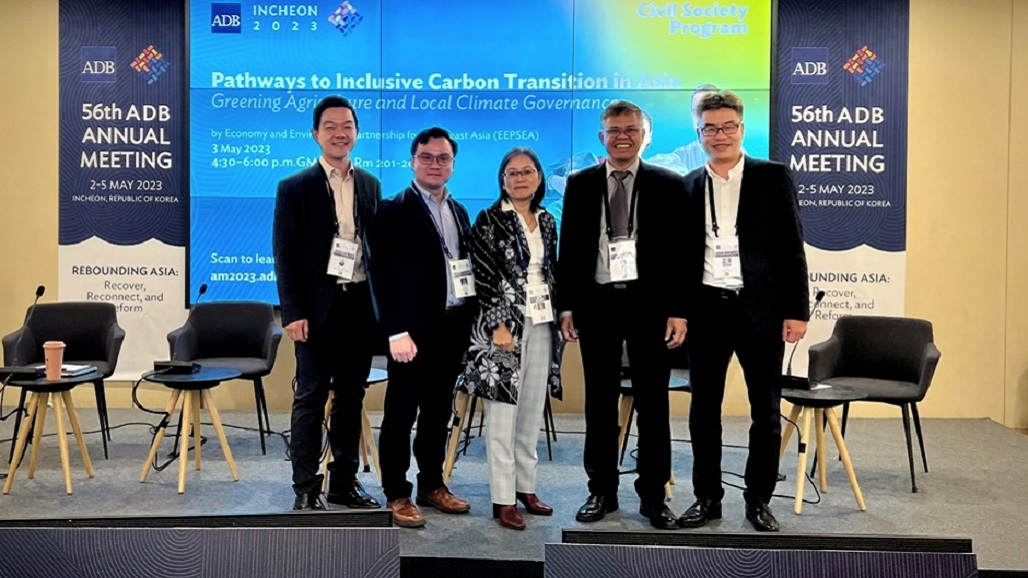
Diving into ADB-ADBI Support for the G20
This ADBI session explored G20-ADB engagement and options for the G20, the G7, and the Global South to address shared challenges. Senior policy makers and experts discussed G20 efforts to boost inclusive recovery and sustainable development and related ADB support. They also exchanged views on G20 and G7 collaboration with the Global South to advance these objectives and prospects for strengthening it, with research-based policy support from think tanks.
Scaling Blended Finance to Support the Net Zero Transition in Asia
Speakers observed that the capital needed for the net zero transition in Asia is estimated to be more than $9 trillion annually through 2050, and that reaching this target will require sourcing an additional $3.5 trillion per year and reallocating close to $1 trillion of current spending from high- to low-emission assets. This session examined how can we ensure the right policy, regulatory, and market backdrop is in place to support blended finance?
Korea Business Briefing
The briefing introduced highly competitive Korean companies equipped with latest technologies and showcase success stories under the themes of smart cities, environmentally-friendly energy, future mobility and transport systems, and digital transformation.
New Sources of Growth for Asia
Panelists remarked that after high growth for many decades, developing Asia in the past three years grew at an average of just 3.6%, adding that low-cost labor-intensive manufacturing is challenged by automation and aging populations, high debt is constraining room for investment, globalization is threatened, and there are many risks to macro stability. This session examined what can drive a sustained rebound in developing Asia’s long-term growth?
Voice and Inclusion: Building Agency and Opportunity for Marginalized People
The session showcased Plan International’s experiences in Jakarta and Manila on creating an enabling environment for the voice of young people—especially young women—to be heard in urban planning processes and on building disaster resilience.
APCOM Foundation highlighted the imperative of involving the most vulnerable populations and ensuring gender and social inclusion in discussing recovery and building back from COVID-19. Furthermore, International Trade Union Congress – Asia Pacific spoke about a new social contract for quality jobs, social protection, social dialogue, just transition, equality and inclusion for Asia to recover with resilience.
Digital, Climate, and Resilience
Co-hosted by the Asian Development Bank Institute and Korea Development Institute, this session explored ways to leverage digitalization to enhance climate change mitigation and disaster resilience in emerging economies. It will feature presentations on digital responses to climate change in Asia and the Pacific and digitalization’s impacts on greenhouse gas emissions. An expert panel discussed policy opportunities to bridge digital skills gaps and boost digital capacity to address climate challenges.
Reinvigorating Regional Cooperation in Central and West Asia – the Role for the Central Asia Regional Economic Cooperation (CAREC) Program
Invited speakers pointed out that many countries in Central and West Asia are facing significant economic and social challenges due to external shocks, adding that these shocks resulted in supply chain disruptions, high inflation, changes in trade flows, and shifts in labor and migration patterns. The session delved into the impacts of these recent shocks on the Central and West Asian economies and explore the potential for regional cooperation and the CAREC program to play a new role in addressing these challenges.
ADB Launches IF-CAP, a Landmark in Climate Finance Innovation
ADB launched the Innovative Finance Facility for Climate in Asia and the Pacific (IFCAP), a landmark program which will help ADB accelerate much-needed climate financing.
Using a leveraged guarantee mechanism, IF-CAP’s initial ambition of $3 billion in guarantees could create up to $15 billion in new climate investment. And it will contribute to ADB’s raised ambition of $100 billion in climate finance for 2019-2030.
Transforming MDBs to Address the Climate Crisis
Speakers recalled that the COP27 Agreement called for the reform of multilateral development banks (MDBs) to substantially increase climate finance. This session discussed the shift required to transform MDBs to make them fit for purpose to address the climate crisis. The panel considered opportunities to optimize our balance sheets, for new business models, expanding adaptation, and managing the risks of such a transformation.
Breaking Barriers: Scaling the Sustainable Finance Agenda in Asia and the Pacific
Panelists mentioned that economies in Asia and the Pacific felt the brunt of the global health emergency, and yet, what has been remarkable is how governments and the private sector came together to engineer the rebound to reinstate the region as the world’s fastest growing. They further pointed out that governments and companies in this region set new priorities and pivoted toward sustainability, which is especially notable in the area of sustainable finance. Successful issuances by governments and companies in the past 12 months showcase real examples in how finance can play a catalytic role in Asia and Pacific’s recovery.
2022 Development Effectiveness Review: Building Results-Based Climate Resilience in Asia and the Pacific
This session highlighted that the ADB has placed combating climate change at the top of its agenda, elevating its climate finance ambition and intensifying its climate endeavors. To track efforts and inform decision-making, a sound results and performance monitoring system is indispensable. This is where ADB’s Corporate Results Framework and the annual Development Effectiveness Review bring value, by analyzing trends, identifying issues, and developing actions that can help improve climate goals.
Equitable Climate Finance for Asia and the Pacific: How Can Civil Society Promote Transparency, Accountability, and Participation?
Panelists noted that the ADB has committed to significantly increase its climate change financing. Ensuring its financing is fit for purpose requires much greater transparency, participation, and accountability. CSOs have strengths in all these areas. This session tackled key issues on enhancing people’s access to information on how climate finance is being allocated, spent, and for what; CSOs and youth’s roles in design, implementation, and monitoring of climate finance projects; and how CSOs can constructively engage with governments and ADB to improve climate finance governance.
Greening the Economy: A Partnership for Private Sector-Led Growth
Speakers called on economies to partner with the private sector to leverage innovation and bridge the infrastructure gap needed to accelerate a green economic recovery. Hear from government, industry, and academic experts as they explore the private sector’s role in sustainable development. This session examined how governments and multilateral development banks can attract private companies to green growth.
Asian Development Bank (ADB)–International Economic Association (IEA) Innovative Policy Research
Launched by ADB President Masatsugu Asakawa at the IEA World Congress in Bali in 2021, the ADB-IEA Innovative Policy Research Award promotes the application of innovative empirical research in economics to support evidence-based policies for addressing key development challenges in Asia and the Pacific. The session presented research findings from the three winners of the 2023 ADB–IEA Innovative Policy Research Award. The awardwinning papers were selected from more than 100 papers covering a wide range of economic topics:
Navigating the Legacy of the COVID-19 Pandemic: Managing Public Debt to Support a Rebounding Asia Amid Global Uncertainty
Speakers pointed out that though fiscal stimulus during the COVID-19 pandemic demonstrated the advantages of debt accumulation, tightening financial conditions are putting enormous strain on emerging and developing economies. This seminar discussed how instruments such as sustainability-linked bonds, insurance-linked securities, and multilateral initiatives that incentivize sustainability-oriented policies and investments could help bring about sustainable development and contribute to greater debt sustainability.
Meeting between Civil Society Organizations and ADB Senior Management
In keeping with tradition, ADB President Masatsugu Asakawa, along with members of ADB senior management, met with representatives of CSOs. His welcome message was followed by a Q&A session with CSO participants, covering topics related to ADB’s support for development and continuing engagement with civil society.
CNBC Debate: Asia and the Pacific’s Transition to Net Zero
Invited panelists remarked that Asia and the Pacific stands to gain the most from ambitious climate action, with expected benefits from avoided damage far greater than costs associated with economic transformation. They pointed out that strategies are needed to ensure equal and fair development while maintaining pro-growth policies that work for all. The CNBC Debate explored key elements of the region’s transition to net zero. What policies can effectively guide change? How will the transition impact economic growth?
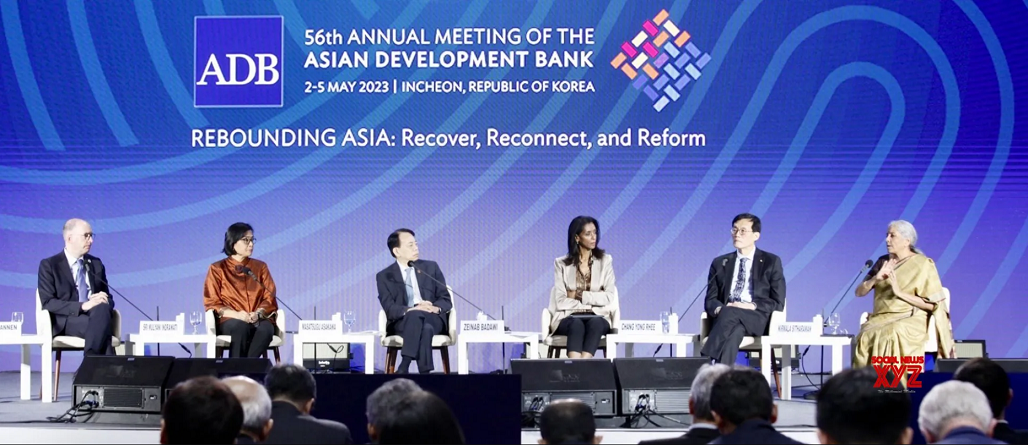
Private Sector Trade and Investment for Food Security
This seminar discussed the importance of the private sector in ensuring food security, including via trade finance for agriculture-related goods and long-term investment in agrifood, underlining the critical role of regional cooperation. The panel also addressed how climate change affects food security, as well as the need for investments to decarbonize the industry.
SASEC Knowledge Event: Green, Efficient, and Resilient Logistics for Sustainable Growth
Speakers stressed that a well-functioning logistics system is more important than ever, ensuring access to vital inputs and boosting productivity. Improving the logistics ecosystem will rebuild supply chains disrupted by the pandemic and make significant strides in the fight against climate change. High-level officials from South Asia shared valuable insights on initiatives for improving logistics, explore lessons learned, and identify emerging priorities.
III. Next Year’s Host Country
The ADB announced Tbilisi, Georgia, as the host of its 57th Annual Meeting to be held from 2 to 5 May 2024. This will be the first time for Georgia to host ADB’s Annual Meeting. “Georgia is a vibrant hub for regional trade—and a crucial bridge between Asia and Europe,” said ADB President Masatsugu Asakawa. “The 2024 Annual Meeting will provide an important opportunity to showcase the country’s rich heritage and tremendous potential.”
“The slogan we’ve chosen for the 57th ADB Annual Meeting represents the need of synergy regionally and globally so that after Recovering, Reconnecting and through the Reforms, we can jointly build the Bridge to the Brighter Future,” said Georgia Finance Minister and ADB Governor Lasha Khutsishvili. The theme for the 57th Annual Meeting is “Bridge to the Future”.
III.. PARTICIPATION IN SIDE EVENT
Lunch Hosted by CTBC Bank Co. Ltd.
Chairman Mr. Morris Li of CTBC Bank Co. Ltd. hosted a luncheon on May 2 for some 70 bankers and regulatory authorities attending the ADB Meeting. Among the attendees were ABA Chairman Mr. Eugene Acevedo and ABA Vice Chairman Mr. Oliver Hoffmann high-ranking representatives from ROC’s Ministry of Finance and the Ministry of Foreign Affairs, as well as high-level officers and executives of banks from other Asian countries, including a number of ABA member banks.
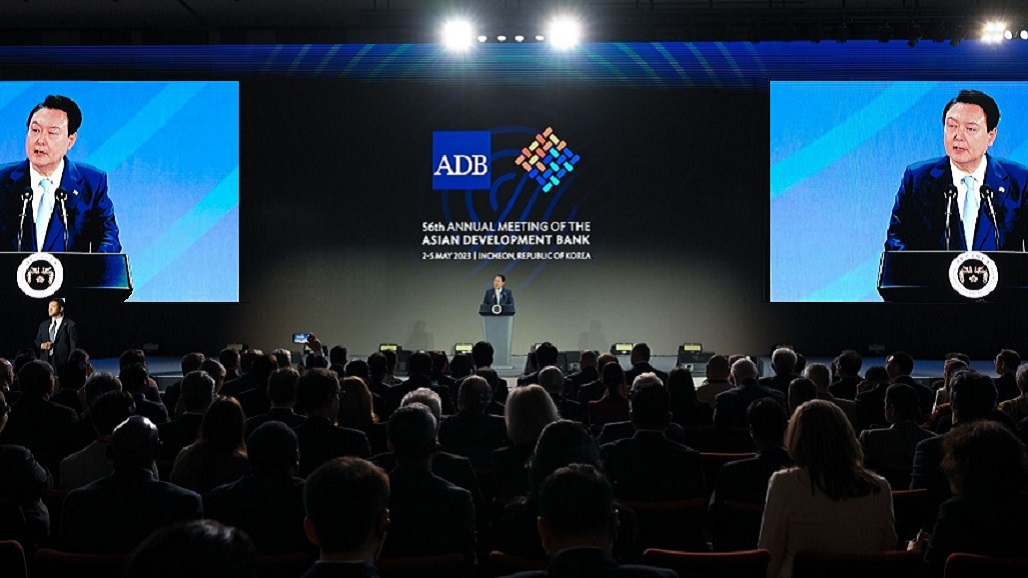

Leave a Reply